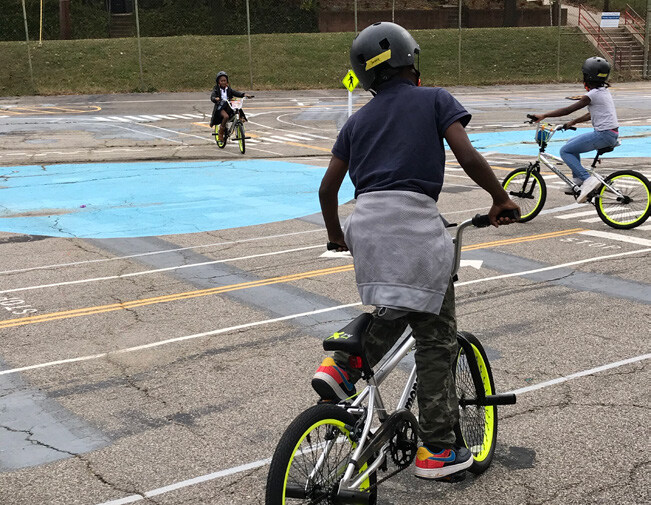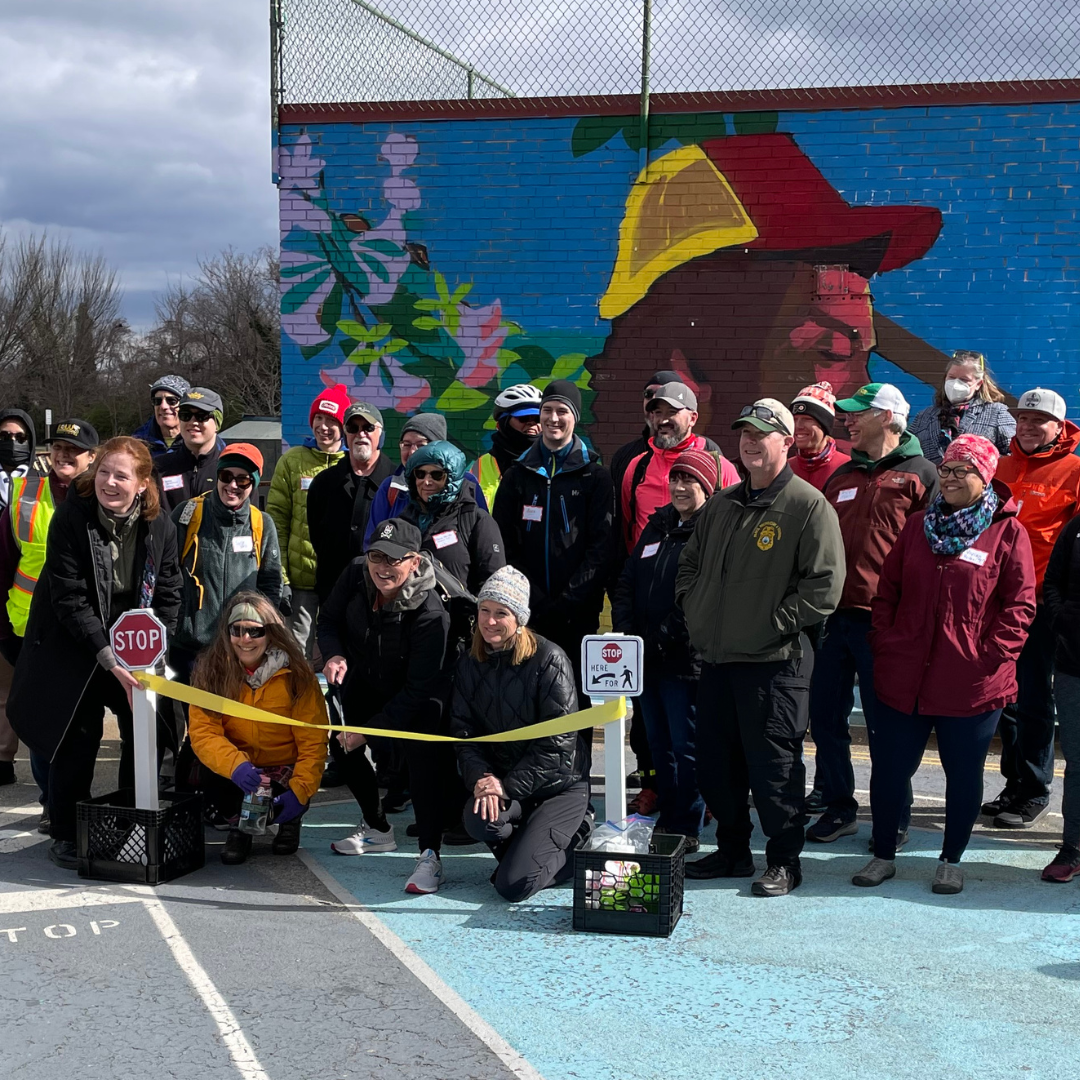DISCOVER YOUR LOCAL BICYCLING COMMUNITY
Find local advocacy groups, bike shops, instructors, clubs, classes and more!
How Traffic Gardens Grow Young Riders
It’s back-to-school time and we’re highlighting how our Bicycle Friendly America awardees and other partners in making bicycling better get more students on bikes. This time, we’re talking about how communities can enable youth to experience and learn about cycling through Traffic Gardens.
The following article, written by education director Alison Dewey for the League’s Summer 2022 magazine, celebrates all the ways this low-cost community resource helps grow young riders and build lifelong safe and confident cycling habits.
The League believes an on-bike education is an experience every child deserves and Traffic Gardens are a great way for communities to facilitate that. We even added Traffic Gardens to the new and improved BFC application as a possible response to the question: “Outside of schools, how are children and youth taught safe cycling skills, at least annually or regularly throughout the year?”
If you’re looking for ideas on how your community can better educate young riders, preview our Bicycle Friendly Community (BFC) program application, and if your community is actively working towards bettering bicycling for everyone, encourage them to apply. The deadline to apply for our Fall 2022 round of awards is Thursday, September 29th!
Some may call them Traffic Gardens, others call them Safety Towns, but whatever name you use, we can all agree that youth-scaled bike riding environments are places for fun and creative learning!
 Traffic Gardens (we’ll stick with one name for consistency) are popping up throughout the U.S. and are quickly becoming a favorite playtime destination for school-age kids and their parents. You can find them in states like Colorado, Oregon, Maryland, Virginia, Washington, Ohio, Pennsylvania, and more!
Traffic Gardens (we’ll stick with one name for consistency) are popping up throughout the U.S. and are quickly becoming a favorite playtime destination for school-age kids and their parents. You can find them in states like Colorado, Oregon, Maryland, Virginia, Washington, Ohio, Pennsylvania, and more!
A Traffic Garden provides a dedicated space for small-scale real-world traffic environments. Imagine one of those children’s rugs with streets and intersections on it, but larger and outdoors on asphalt. They contain common roadway elements such as intersections, stop signs, yield signs, pedestrian crosswalks, roundabouts, railroad crossings, one-way traffic, two-way traffic, and more—all of which are presented on a scale to accommodate smaller users. While Traffic Gardens can be enjoyed by all ages, typically you’ll see kids anywhere from as young as three years old all the way up into the pre-teen years using them.
Traffic Gardens provide a protected area to allow kids to play on bikes and begin to learn how to safely and confidently navigate traffic and share the environment with other users. Children develop important skills for when they begin riding their bikes to school, around their neighborhood, and when they ride just for fun. A stop sign installed three to four feet from the ground is much more visible and a more effective learning tool to a five-year-old than a real-world stop sign, which is typically installed seven to eight feet from the ground—a long stretch of the neck up for a young person.
 Traffic Gardens are an important learning tool for young people to see that biking is fun, social, and can help keep themselves and the planet healthy. That’s why at the National Bike Summit, we provided attendees with the unique opportunity to visit a Traffic Garden at an elementary school in Washington, D.C.
Traffic Gardens are an important learning tool for young people to see that biking is fun, social, and can help keep themselves and the planet healthy. That’s why at the National Bike Summit, we provided attendees with the unique opportunity to visit a Traffic Garden at an elementary school in Washington, D.C.
Participants rode about four miles from Capitol Hill to Neval Thomas Elementary school near the Anacostia River Trail where we met with a team from Discover Traffic Gardens. Attendees learned about Traffic Gardens as a roadway safety and skills educational tool, as well as funding opportunities for installing new facilities, successful operational models and examples of how to work with your local community to bring a Traffic Garden to your area. This hands-on experience was valuable to pave the way for more Traffic Gardens across the U.S.
The 2022 National Bike Summit also offered online content about Traffic Gardens along with other ways to provide bike safety education for youth. In the virtual breakout session “Building Community through Fun” and “Creative Youth Bike Education”, attendees heard about a Traffic Garden in Olympia, Washington, from Danielle King, Thurston County Coordinator and grants manager, Special Projects for Safe Kids. Emi Kubota, founder and president of KidCycle Club in Asheville, NC, also presented.
In the KidCycle Club, kids bike in parks, on singletrack, and on other natural surface trails. Youth learn how to shred, maintain balance while traversing boards, and how to navigate a pump track, all while becoming more confident in trail riding! Nicole Chandler and Sam Balto talked about teaching bike safety in schools in Little Rock, AR, and Portland, OR, respectively through initiatives like bike buses, physical education classes, after-school activities, and family involvement. There are many ways to get more kids on bikes and with each, our future looks brighter and brighter.